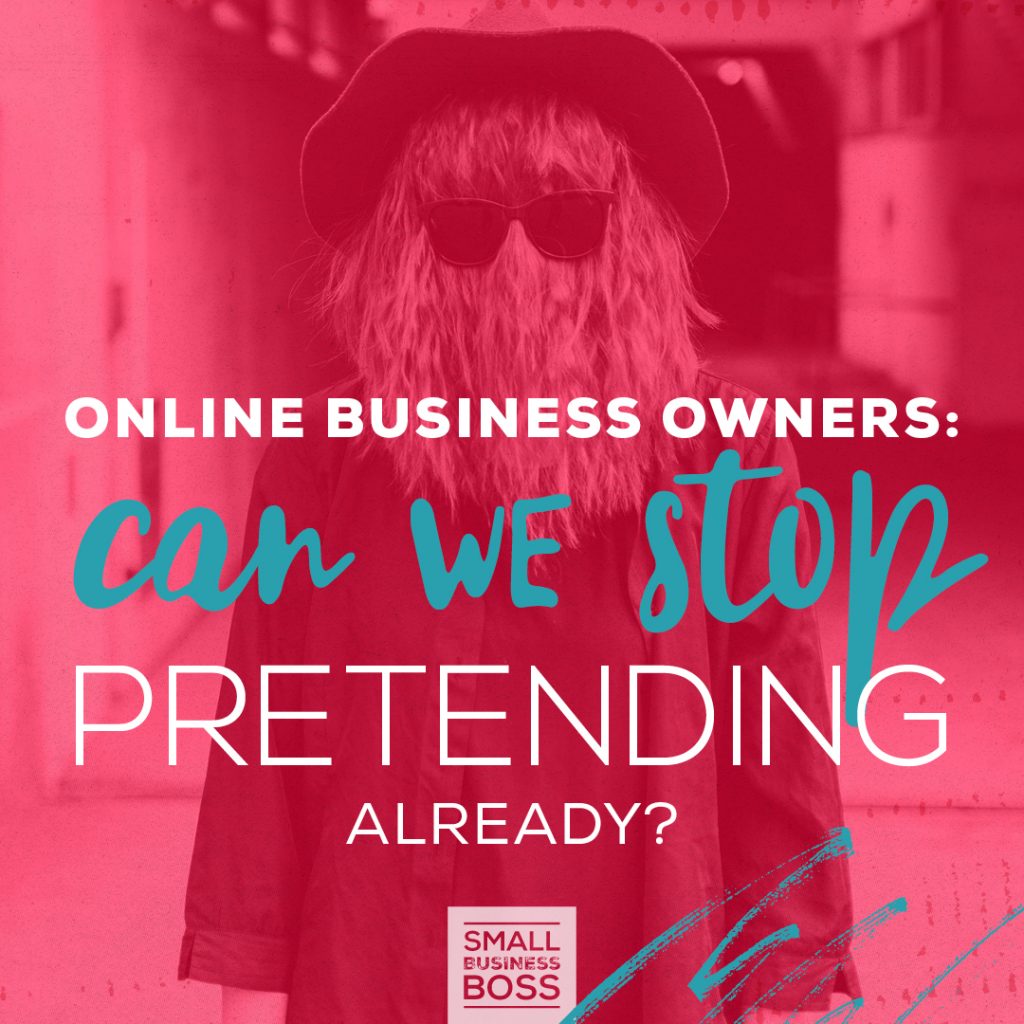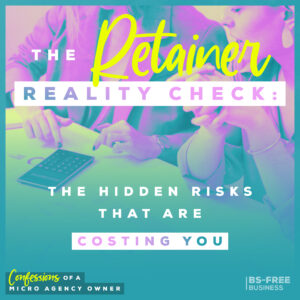
Search the site:
Online Business Owners: Can We Stop Pretending Already?
Over the last few months, my love/hate relationship social media has intensified to the point where I find myself actively avoiding social media. When I try to psych myself up to open up Instagram or Facebook, I feel dread creeping in.
Trust me when I tell you, this isn’t a good thing as social media is an essential part of my day-to-day as an online-based business.
Once I noticed this pattern, I had to dig into WHY this was happening. Why was I not willing to open up Instagram or Facebook when this year has been one of the most rewarding ones ever with social media? (I’ve consistently been delighted as I’ve made some incredible connections online and had conversations I wouldn’t have had anywhere else with cool people I’d love to hang with IRL.)
The culprit?
The sheer level of BS I see every single day online. I literally feel like I can’t take it some days and I feel like I want to throw my phone away.
I know this sounds dramatic, but that’s where I’m at. (And maybe some of you are right with me!)
Before I explain what the hell my problem is, I want to preface all of this with the fact that what I’m about to say is nothing new. I’m not the only one feeling this way. Nor will I be the only one to give voice to this.
I’m not exceptional, yet, I’m writing this down because…enough already. From my perspective, all of this boils down to two big issues I see in online business circles.
And this shit needs to stop.
Issue #1: Pretending Like You’re the Inventor of Things
We need to stop being precious and realize that most of the things we talk about or teach aren’t original ideas. Truly, there’s nothing new.
Sure you can have your own spin or approach on it, but it’s time to start recognizing that you’re very likely not the originator of the idea that you’re being so darling about sharing with the world as a “bold”or “revolutionary” new concept.
Stop it. I’m serious. Just stop it already.
When you do this, it makes you look like a sad knock off version of the real thing who’s not astute enough to give credit where credit is due. Instead of making you look more credible, it damages your authority.
(And if you’re not sure how to do this, check out my disclaimer above where I said I’m not the only one addressing this or feeling this way.)
One of my favorite examples of someone who does this beautifully is my friend and trusted coach, Tanya Geisler. Her work is around the imposter complex, and she makes a point of citing the creators of this concept every time she teaches it. I’ve known her for years, and I always smile when I hear her do this, as citing your sources is something that’s in short supply.
If you’re not sure of the origins of an approach or idea, take some time and do a bit of homework. Make Google your friend. The same way you’d reference sources for an academic paper, feel free to do the same for the body of work you’re basing your teaching, course or service on.
What people want more than ever is to see integrity. It’s the reason why people like Rachel Hollis have been called out for ripping off other people’s quotes and sharing them on Instagram. People are seriously O-V-E-R this fakery, and by taking a little extra time and care, you’ll show that you’re legit.
Issue #2: Stop Pretending You Have All the Answers
A pretty popular piece of general business advice is to “fake it until you make it”. I totally have been guilty of telling people to do that, but I feel like we’re at the point where this advice has been taken too far.
For me, when I’d dole out that advice, the intent was to tell people to act “as if” even if they didn’t feel that way yet. For many members of my community, they struggle with confidence, and this was really about getting their behavior to reflect the reality of where they were, even if their brain hadn’t quite hopped on board yet.
But here’s where the problem lies. Things are completely out of control with people dishing up advice and answers where they have zero lived experience. Tara McMullin talks about the culture of advice that exists in the business world, and I want to take that one further, and say from where I sit, it’s going way beyond advice into a culture of having all the answers all the freakin’ time.
We don’t want anyone to think we don’t know what we’re doing, so we’ve become a bunch of know-it-alls who have the answers to absolutely everything. Even if we’re not really sure what we’re talking about or we’re making it up as we go.
Truth? This is downright harmful. When people ask a question, they’re genuinely asking for input and are looking for help. When they’re met with people trying to look a certain way or position themselves as an expert who don’t know what’s what, that’s a major problem.
To some degree, most of us are guilty of this, because we’re not conditioned to admit we may not know something, particularly if someone is asking us. Or we want the ego stroke of being the one with the answers.
But here’s the alternative. And it’s a lesson I’m extremely grateful I learned in the first few months in my role as an account coordinator at a PR agency.
When we’d call the media (and yes, I mean on the phone) sometimes they’d ask questions about our client that we didn’t know the answer to. Or in other situations when you were in a meeting with a client, you simply didn’t know the answer. So we were trained to answer these questions with a single line, “I don’t know, let me get back to you on that as soon as possible.”.
Simple, right? And it’s a line I still use multiple times per week with clients. Because after 20+ years in marketing and communications, I don’t always have an answer at the ready.
And you know what? Instead of coming up with an answer that damages my credibility, people trust me more because I’m willing to admit I’m not sure and that I need to check. That’s what makes for answers that actually solve a problem or address a challenge, which is exactly what people are paying me for.
It’s time to stop worrying so much about looking smart or innovative, and worrying more about being thoughtful and acting with integrity. The next time you’re tempted to act like the idea is 100% all yours, or to rush to share an answer, stop and check your ego. That’ll stand out much more than being another online expert who’s full of it.

I’m Maggie Patterson (she/her), and services businesses are my business.
I have 20+ years of experience with client services, am a consultant for agency owners, creatives, and consultants, and vocal advocate for humane business practices rooted in empathy, respect, and trust.
Read or Listen to the Latest
For Solo Business Owners

Growing a solo service business is tough.
It’s even harder when you’re bombarded with BS advice that steers you away from your values and why you started your business in the first place.
This is the podcast for solo creatives and consultants who want to remain as a team of one and have zero interest in the hustle and grind of typical business teachings.
Subscribe now and never miss an episode.
For Micro Agency Owners
Most podcasts for agency owners obsess over revenue growth as the ultimate success metric.

But here’s the truth: not everyone wants to make millions. Your goal might be to build a sustainable business that lets you have a life and doesn’t run you into the ground.
Join me as I spill my shameless confessions and share everything I’ve learned about building a micro agency that skips the BS of tired and typical agency teachings.
Follow Now on All Major Podcast Platforms








